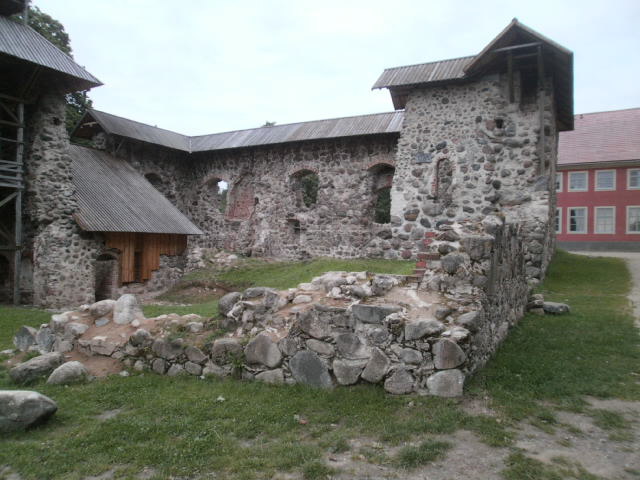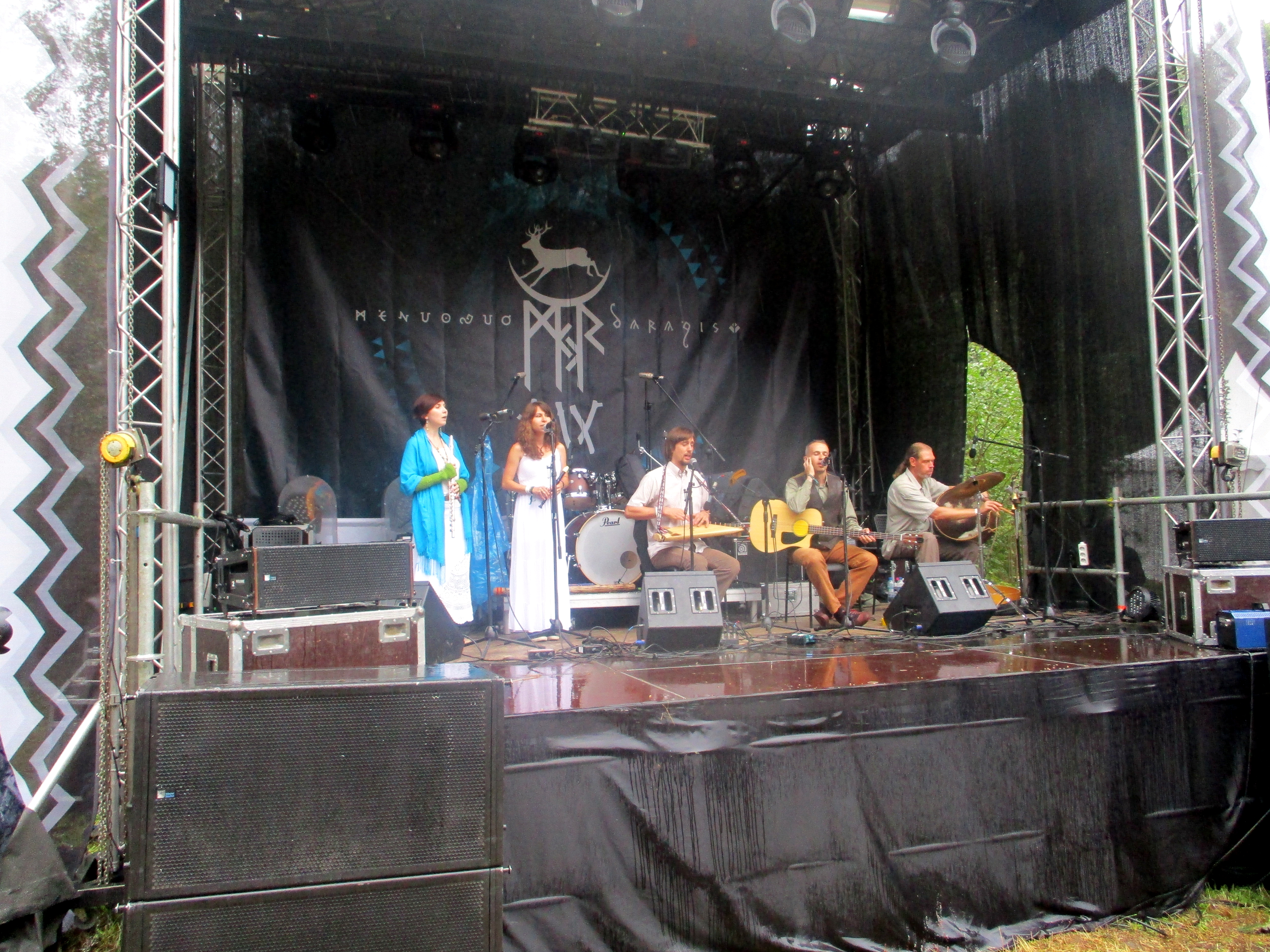|
Skyforger
Skyforger is a heavy metal band from Latvia which was formed in 1995 out of the remains of doom metal band Grindmaster Dead. Musical style and lyrical themes Most of their songs are about Baltic mythology and warfare; they also play Latvian folk songs and their metal arrangements. Although Skyforger is known for their folk metal, the style on their demo ' is essentially black metal. The band also has performed and recorded a number of folk songs, including the entirety of their acoustic fourth album ', released in 2003. Folk elements can be found on all of their albums. In December 2005, during the presentation of their album, ''Semigalls' Warchant'', the band announced their next album would be experimentation with thrash metal. They later pointed out that Latvian history still has enough untold stories, meaning their lyrics will retain their folk/pagan fashion. History In 2010, Skyforger signed with American label Metal Blade Records and released their 5th studio album ... [...More Info...] [...Related Items...] OR: [Wikipedia] [Google] [Baidu] |
Kurbads (album)
''Kurbads'' is the fifth studio album by the Latvian folk metal band Skyforger. The album was released on 26 April 2010 in Europe and on 11 May 2010 in the United States through Metal Blade Records. Recording and production On 12 September 2008, Skyforger announced that the band had entered the studio to record their newest album. The recording took place at the band's former folk instrumentalist Kaspars' studio "Lauska", who was not an active member of the band anymore, but handled the sound engineering duties and appeared on the album. On May 7, 2009 the frontman Pēteris revealed the title and theme of the album. On 2 March, 2010 Skyforger posted online their first single "Son of the Mare" and revealed album cover, as well as the track list. One day later the band published a studio report on their official YouTube channel. In a later interview Pēteris recalled the album's recording process: Musical style and lyrical themes On the same Facebook post revealing the album ... [...More Info...] [...Related Items...] OR: [Wikipedia] [Google] [Baidu] |
Pērkoņkalve
''Pērkoņkalve'' (''Thunderforge'') is Skyforger's third full-length album. It was recorded and mixed from late 2002 to early 2003 at the Phoenix Studios and released on 1 June 2003 by Folter Records. The official presentation of the album took place on 21 September 2003 at the festival Baltijas Saule (''Baltic Sun'') in Riga. In a 2006 interview, frontman Pēteris Kvetkovskis referred to the album as the band's '' Reign In Blood'', i.e. Skyforger's best work, but also expressed hope the band's best album is yet to come. He also recalled an incident when a factory refused to press another batch of CDs after its boss saw the swastika in both the album's cover art and band's logo (see Skyforger#Controversy). In 2009 Folter Records released a red 12" vinyl edition of the album limited to 500 copies. Musical style and lyrical themes ''Pērkoņkalve'' indicates a departure from the war themes (Battle of Saule, Latvian War of Independence, and Latvian Riflemen) covered by th ... [...More Info...] [...Related Items...] OR: [Wikipedia] [Google] [Baidu] |
Folk Metal
Folk metal is a fusion genre of heavy metal music and traditional folk music that developed in Europe during the 1990s. It is characterised by the widespread use of folk instruments and, to a lesser extent, traditional singing styles (for example, Dutch Heidevolk, Danish Sylvatica and Spanish Stone of Erech). It also sometimes features soft instrumentation influenced by folk rock. The earliest folk metal bands were Skyclad from England and Cruachan from Ireland. Skyclad's debut album '' The Wayward Sons of Mother Earth'' was released in 1991 and would be considered a thrash metal album with some folk influences, unlike Cruachan’s early work which embraced the folk element as a defining part of their sound. It was not until 1994 and 1995 that other early contributors in the genre began to emerge from different regions of Europe and beyond. Among these early groups, the German band Subway to Sally spearheaded a different regional variation that over time became known as medie ... [...More Info...] [...Related Items...] OR: [Wikipedia] [Google] [Baidu] |
Metal Blade Records
Metal Blade Records is an American independent record label founded by Brian Slagel in 1982. The US office for Metal Blade is located in Agoura Hills, California. It also has offices in Germany, Japan, Canada, and the UK. The label is distributed in the US by RED Distribution, and in Canada by Sony Music Entertainment. It was distributed by Warner Bros. Records in the United States from 1988 to 1993. History Metal Blade Records was founded by Brian Slagel, who at the time was a record store employee in suburban Los Angeles, as a way to increase the recognition of local metal bands. The label's first release was a compilation album called ''The New Heavy Metal Revue presents Metal Massacre'', and included Metallica, Ratt, and Black 'n Blue. Metal Blade artists that have appeared on the ''Billboard'' 200 chart include Goo Goo Dolls, Amon Amarth, Trouble, As I Lay Dying, Behemoth, the Black Dahlia Murder, Cannibal Corpse, Fates Warning (the first Metal Blade band to have a ... [...More Info...] [...Related Items...] OR: [Wikipedia] [Google] [Baidu] |
Auļi
Auļi is a Latvian folk/ world music band formed in 2003. The band consists of 6 bagpipers, 3 drummers and 1 electric cello player. History In 2005 Auļi released their 12-track debut album ''Sendzirdēju''. In 2010 the band released their third studio album titled ''Etnotranss'' (Ethno trance), a term they created to describe their music. The album features Andris Grunte on double bass. On May 4, 2013, Auļi performed a 10-year anniversary concert at Palladium Riga. The same month the band released a best of album ''Dižducis'' with 12 of their previously released compositions, re-arranged by multi-instrumentalist Kārlis Auzāns and joined by Juris Kaukulis from Dzelzs Vilks, folk singer Zane Šmite, Madagascarian musician Kilema (vocals and valiha) and other guest musicians. In 2016 Auļi released their fifth studio album ''Gadalokos'' with compositions about the Latvian seasons (''Sala laiks'', ''Sērsnu laiks'', ''Pavasara laiks'', ''Ziedu laiks'', ''Siena laiks'', ''R ... [...More Info...] [...Related Items...] OR: [Wikipedia] [Google] [Baidu] |
The Baltic Course
''The Baltic Course'' is a pan-Baltic business magazine. The first number was issued in 2000. Magazine's editor-in-chief An editor-in-chief (EIC), also known as lead editor or chief editor, is a publication's editorial leader who has final responsibility for its operations and policies. The highest-ranking editor of a publication may also be titled editor, managing ... is Olga Pavuka. References External links * Baltic states Magazines established in 2000 Business magazines Magazines published in Estonia {{Europe-business-mag-stub ... [...More Info...] [...Related Items...] OR: [Wikipedia] [Google] [Baidu] |
100th Anniversary Of The Latvian Republic
The 100th Anniversary of the Latvian Republic ( lv, Latvijas valsts simtgade) also commercialized as Latvia 100 (''Latvija 100'') is a national event in Latvia celebrating the country's 100th anniversary since its 1918 establishment. The main celebrations were held on 18 November 2018, and other commemorative events are set to take place from 2017 to 2021. Outside from the official celebrations, 18 November is also a public holiday, being the Proclamation Day of the Republic of Latvia. The slogan of the event is ''Es esmu Latvija'' ('I Am Latvia'). Background On 18 November 1918, The People's Council of Latvia, which was a coalition of competing Latvian political factions, proclaimed the independence of the Latvian region from the Russian Empire and established a new state, the Republic of Latvia, following a summit held inside the Latvian National Theatre. A Provisional Government was immediately created, with Kārlis Ulmanis acting as its first Prime Minister. Two and a ... [...More Info...] [...Related Items...] OR: [Wikipedia] [Google] [Baidu] |
Neo-Nazism
Neo-Nazism comprises the post–World War II militant, social, and political movements that seek to revive and reinstate Nazism, Nazi ideology. Neo-Nazis employ their ideology to promote hatred and Supremacism#Racial, racial supremacy (often white supremacy), attack racial and ethnic minorities (often antisemitism and Islamophobia), and in some cases to create a fascist state. Neo-Nazism is a global phenomenon, with organized representation in many countries and international networks. It borrows elements from Nazi doctrine, including antisemitism, ultranationalism, racism, xenophobia, ableism, homophobia, anti-communism, and creating a "Fourth Reich". Holocaust denial is common in neo-Nazi circles. Neo-Nazis regularly display Nazi symbolism, Nazi symbols and express admiration for Adolf Hitler and other Nazi leaders. In some European and Latin American countries, laws prohibit the expression of pro-Nazi, racist, antisemitic, or homophobic views. Many Nazi-related symbols a ... [...More Info...] [...Related Items...] OR: [Wikipedia] [Google] [Baidu] |
Limbaži
Limbaži (, et, Lemsalu, german: Lemsal, liv, Limbaž) is a town in the Vidzeme region of northern Latvia. Limbaži is located 90 km northeast of the capital Riga. The population is 6888 people. During the Middle Ages, as part of Livonia, Limbaži was a fortified town with stone walls, second in importance only to Riga. Etymology The name is believed to be a Latvianised version (hence the ''-aži'' ending) of the Livonian word ''Lembsel'' (''Lemesel'') meaning "wide isle in a forest swamp". The German ''Lemsahl'' (''Lemsal'') is derived from the Livonian name. According to folk etymology, the name ''Limbaži'' originated sometime in the 17th century. A recently arrived Swedish minister overheard the words "Limba" and "āži" (Latvian for ' male goats'). Mistakenly, he assumed this was the name of the place, and so the town was called "Limbaži". History In ancient times, Limbaži was a Livonian settlement known as ''Lemisele'', part of Metsepole. In the early 13th c ... [...More Info...] [...Related Items...] OR: [Wikipedia] [Google] [Baidu] |
Public Broadcasting Of Latvia
Public Broadcasting of Latvia ( lv, Latvijas sabiedriskais medijs, lit=Latvian Public Media – LSM) is a publicly funded radio and television organization operated by both of Latvia's public broadcasters – Latvian Television and Radio Latvia. LSM provides news, analysis, culture, entertainment and new experimental content, produced mainly by Latvian Television and Radio Latvia, and by the portal’s editorial personnel. The site was launched on 3 February 2013. LSM content is also available in Russian and English. News content in English was made available from 1 July 2014. A unified news portal was one of the steps planned in a much wider convergence of both public broadcasters. In 2012, Latvia’s National Electronic Media Council (NEMC) approved the concept of creating a new Latvian public service media organization. NEMC members had to decide from 3 different scenarios: * partial convergence (institutional independence, but both media to engage in joint projects); * ... [...More Info...] [...Related Items...] OR: [Wikipedia] [Google] [Baidu] |
Old Prussian
Old Prussian was a Western Baltic language belonging to the Baltic branch of the Indo-European languages, which was once spoken by the Old Prussians, the Baltic peoples of the Prussian region. The language is called Old Prussian to avoid confusion with the German dialects of Low Prussian and High Prussian and with the adjective ''Prussian'' as it relates to the later German state. Old Prussian began to be written down in the Latin alphabet in about the 13th century, and a small amount of literature in the language survives. Classification and relation to other languages Old Prussian is an Indo-European language belonging to the Baltic branch. It is considered to be a Western Baltic language. Old Prussian was closely related to the other extinct Western Baltic languages, namely Sudovian, West Galindian and possibly Skalvian and Old Curonian. Other linguists consider Western Galindian and Skalvian to be Prussian dialects. It is related to the Eastern Baltic languages suc ... [...More Info...] [...Related Items...] OR: [Wikipedia] [Google] [Baidu] |
.jpeg/1200px-Subway_To_Sally_(Sundstock_05).jpeg)


